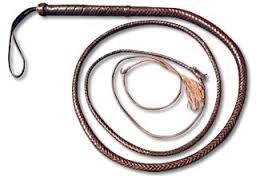whip
英 [wɪp]
美 [wɪp]
- vt. 抽打;煽动;搅打(蛋,奶油);彻底击败
- n. 鞭子;抽打;车夫;[机] 搅拌器
- vi. 抽打;急走;拍击
使用频率:

中文词源
whip 鞭子
来自低地德语wippen,挥舞,摆动,来自PIE*weip,转,摇摆,颤动,词源同wipe,vibrate。由挥鞭子的动作引申为鞭子。词义演变参照farrow.
英语词源
- whip
-
whip: [13] Whip was originally a verb, meaning ‘move quickly’. It was probably borrowed from Middle Low German or Middle Dutch wippen ‘vacillate, swing’, which in turn went back to the prehistoric Germanic base *wip- ‘move quickly’ (source also of English wipe). And *wip- itself was descended from Indo-European *wib-, from which English gets vibrate. Wafer, weave, web, etc come from variants of the same base. The application of whip to a ‘flexible implement for lashing’ is first recorded in the 14th century.
=> vibrate, weave, wipe - whip (v.)
- mid-13c., wippen "flap violently," not in Old English, of uncertain origin, ultimately from Proto-Germanic *wipjan "to move back and forth" (cognates: Danish vippe "to raise with a swipe," Middle Dutch, Dutch wippen "to swing," Old High German wipf "swing, impetus"), from PIE *weip- "to turn, vacillate, tremble" (see vibrate). "The senses of both [noun and verb] no doubt represent several independent adoptions or formations" [OED]. The cookery sense is from 1670s. Related: Whipped; whipping. Whip snake first recorded 1774, so called for its shape.
- whip (n.)
- "instrument for flagellating," early 14c., from whip (v.) and perhaps in part from Middle Low German wippe "quick movement." In parliamentary use from 1850 (the verb in this sense is recorded from 1742), from the sense in fox-hunting. The parliamentary whip's duty originally was to ensure the attendance of party members on important occasions.
权威例句
- 1. The jockey said he tended to flick horses with the whip.
- 骑手说他经常会用鞭子抽马。
- 2. Few people doubt his ability to whip the economy into shape.
- 几乎无人怀疑他整顿经济的能力。
- 3. He could whip a crowd into hysteria.
- 他能让一群人变得歇斯底里。
- 4. Whip the cream until thick.
- 搅打奶油直到它变黏稠。
- 5. Whip the eggs, oils and honey together.
- 把鸡蛋、油和蜂蜜搅打在一起。